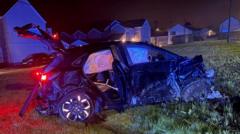Did the Airport Fear Police Violence?

## The Case of Mohammed Amaaz and Muhammad Amaad: A Detailed Examination of Allegations and Defense at Manchester Airport
The incident at Manchester Airport involving Mohammed Amaaz and his brother Muhammad Amaad has garnered significant attention due to the serious allegations of assault against police officers. As the trial unfolds, it raises critical questions about self-defense, police conduct, and public perception of law enforcement. This article aims to provide a comprehensive overview of the events leading up to the charges, the testimonies presented in court, and the broader implications of this case on community-police relations.
### Context of the Incident
On July 23, 2024, a confrontation erupted in the pay station area of Terminal 2 at Manchester Airport. Allegations suggest that the police were attempting to arrest individuals involved in a disturbance linked to a flight that had arrived with the brothers’ mother. This incident escalated quickly, leading to accusations of violence against police officers by the Amaaz brothers, both of whom deny the charges.
### Background of the Defendants
**Mohammed Amaaz**, 20, and **Muhammad Amaad**, 26, are from Rochdale and have familial ties to law enforcement, with several relatives having served in Greater Manchester Police. This background complicates the narrative as it suggests a nuanced view of police interactions and a potential conflict of interest during their encounters.
### The Allegations: Assault on Police Officers
The prosecution has alleged that the brothers subjected police officers to a "high level of violence." Specific charges include:
- Assaulting PC Zachary Marsden and PC Lydia Ward, resulting in actual bodily harm.
- Assaulting emergency worker PC Ellie Cook.
- An earlier assault on a civilian at a Starbucks café within the airport.
### Testimony of Mohammed Amaaz
During the trial, Mohammed Amaaz provided a detailed account of his perspective during the altercation. His testimony revealed several key points:
1. **Fear of Violence**: Mr. Amaaz expressed that he felt threatened during the incident, believing that the police officer who grabbed him intended to inflict serious harm. He stated, “I was frightened. I just didn't want to go down to the ground. I believe if he forced me down to the ground he would just have battered me to the point where I've died.”
2. **Lack of Identification**: He highlighted that the police officer did not identify himself or explain the reason for his actions, which contributed to his fear and confusion.
3. **Misunderstanding of Police Actions**: Mr. Amaaz claimed he did not initially recognize PC Lydia Ward as a police officer, implying that the chaotic nature of the situation led to a misunderstanding of the authorities' intentions.
4. **Protective Instinct**: He expressed a desire to protect his brother during the encounter, indicating that his actions were driven by an instinctual response to perceived threats.
5. **Physical Confrontation**: The altercation escalated when Mr. Amaaz struck PC Marsden from behind after witnessing what he believed to be a gun aimed at his brother. He described feeling a loss of energy as he fell to the ground following the use of a Taser.
### The Aftermath of the Incident
Footage of the incident circulated widely on social media, depicting the chaotic scene as Mr. Amaaz lay on the ground while PC Marsden allegedly kicked him in the head. Mr. Amaaz recounted feeling a boot striking his face, resulting in temporary unconsciousness. This visual evidence has drawn public scrutiny and raised questions about police conduct during arrests.
### The Defense: Claims of Self-Defense
The Amaaz brothers are asserting a defense of self-defense, arguing that their actions were a reaction to an unprovoked attack. Their legal representative, Imran Khan KC, is emphasizing the brothers' perspective that they were under attack throughout the confrontation. This defense raises crucial points regarding the interpretation of self-defense in the context of police encounters, especially when there are allegations of excessive force.
### Broader Implications for Community-Police Relations
This case touches on significant themes regarding the relationship between law enforcement and the communities they serve. Key considerations include:
- **Public Trust in Law Enforcement**: The Amaaz brothers' claims of fear regarding police conduct highlight ongoing concerns related to police brutality and accountability. Public perception of law enforcement is influenced by high-profile cases that raise questions about police practices.
- **Training and De-escalation**: The incident underscores the need for police training in de-escalation techniques, particularly in public spaces where misunderstandings can lead to violence. A focus on communication and identification during confrontations may help reduce the likelihood of such incidents.
- **Community Engagement**: Engaging with communities to build trust can foster better relationships between police and citizens. Programs aimed at educating the public about police procedures and rights can empower individuals during encounters with law enforcement.
### Conclusion
The ongoing trial of Mohammed Amaaz and Muhammad Amaad sheds light on the complexities of police interactions and the varying perceptions of law enforcement. As the proceedings continue, the outcomes will likely have lasting implications not only for the individuals involved but also for broader discussions on accountability, self-defense, and community safety.
In a society where such incidents are becoming increasingly common, it prompts us to consider: How can we bridge the gap between law enforcement and communities to ensure safety and justice for all?
### Frequently Asked Questions
#### What are the specific charges against Mohammed Amaaz and Muhammad Amaad?
Both brothers face multiple charges, including assaulting police officers, causing actual bodily harm, and an earlier assault on a member of the public.
#### What is the defense's argument in this trial?
The defense argues that the brothers acted in self-defense, claiming they were responding to an unprovoked attack by police officers.
#### How might this case impact community-police relations?
This case may affect public perception of law enforcement, highlighting the need for improved police practices, accountability, and community engagement.
### Call to Action
In light of the ongoing discussions surrounding police conduct and community safety, it is essential to engage in conversations about improving relationships between law enforcement and the public. How can we work together to ensure that all individuals feel safe and respected in their interactions with police?
#CommunitySafety #PoliceConduct #JusticeForAll
Published: 2025-07-17 18:19:09 | Category: technology



